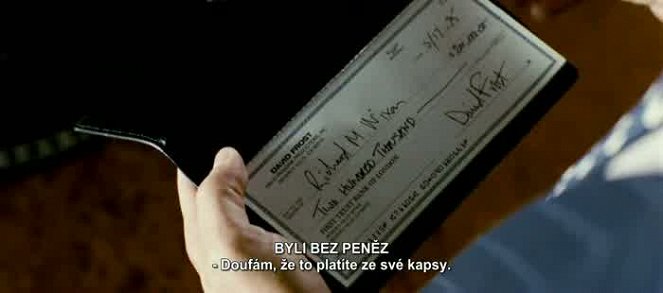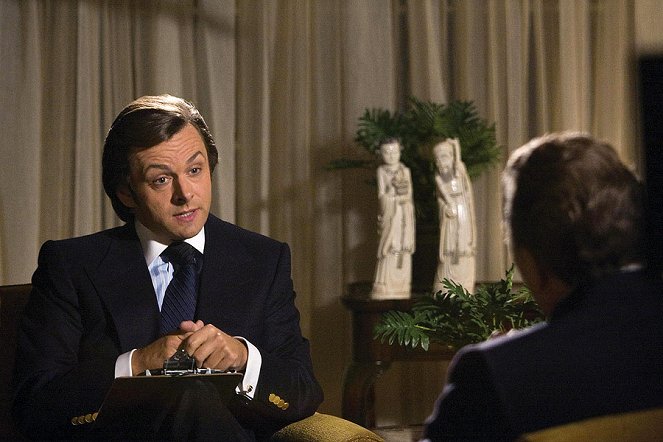Directed by:
Ron HowardCinematography:
Salvatore TotinoComposer:
Hans ZimmerCast:
Frank Langella, Michael Sheen, Sam Rockwell, Kevin Bacon, Matthew Macfadyen, Oliver Platt, Rebecca Hall, Toby Jones, Andy Milder, Kate Jennings Grant (more)VOD (4)
Plots(1)
Based on Peter Morgan's stage play, Ron Howard directs this dramatised account of the 1977 TV interviews between scandalised former President Richard Nixon and British talk-show host David Frost. Three years after the Watergate scandal that led to his demise, former president Richard Nixon (Frank Langella) sat down with Frost (Michael Sheen) to discuss, for the first and only time, the details of his term in the White House and his spectacular fall from grace. With the famously steely Nixon confident that he could come out tops in the encounter, and Frost's side questioning whether this was a step too far, media commentators prepared themselves for a PR exercise. But when the interviews got underway, observers were astonished when both men abandoned their usual stances, and chose to conduct an open, honest and frank exchange of views, covering all the areas of concern that had previously remained off-limits. In addition to covering the interviews themselves, the film also traces the difficulties that had to be overcome, and egos that had to massaged, before the historic events could finally take place. (Fabulous Films)
(more)Videos (3)
Reviews (13)
Of the films with Peter Morgan's screenwriting signature that I've seen so far, Frost/Nixon is unfortunately one of the weaker ones. On the one hand, there are perfect performances by Frank Langella, Michael Sheen, Sam Rockwell, and Kevin Bacon, and a neat documentary atmosphere. On the other hand, the characters are pretty much useless, including (unfortunately) Rebecca Hall, whose purpose I didn't fully understand, and some off-camera scenes are barely believable, for example, the late-night phone call. I guess the original stage play is more concentrated, and thus probably better.
()
With this Oscar contender I have the same problem as with all other films by Howard, technically it’s flawless, but the emotional effect on me is zero. Those two hours went by nicely, the Frost-Nixon interview was great, but I don’t feel like watching this film ever again. If I had to compare it with this year’s other big political drama (Milk), Frost/Nixon would win by a long shot because I felt that this one at least knows what it Is about, while Milk felt very empty.
()
My Oscar favourite this year. After the awful The Da Vinci Code, Ron Howard must have had a fit of creativity and I applaud him. This film is one of the best political dramas in many years. It is engagingly shot, not boringly descriptive, on the contrary, through an interesting verbal TV duel between the two leading characters, it presents the socially tense period after the biggest stain on the political culture of the history of the United States, the Watergate affair (when a large part of the American society could not stomach Ford's amnesty on Richard Nixon's transgressions). With his piercing gaze, thoughtful diction and mesmerizing confidence, Frank Langella is about ten times more devilish than Nixon himself, and I hope he has a pleasant Oscar night.
()
A boxing match between a political champion and a loser from an entertainment slum, 4 rounds at a dazzling pace and nerve-wracking gradation. Ron Howard undoubtedly trimmed the political issue, adjusted both characters and put them into the ever popular scheme "David vs. Goliath KO in the last round"... However, I am honestly searching in vain, trying to find out when I enjoyed it more and when, behind the brilliantly elaborated scheme, I found such an exciting background and point that goes beyond mere entertainment. The Frost/Nixon duel reveals the part of politics one has to follow breathlessly, media fireworks, a powerful story and a remarkable message about the power of the television screen. I don't think this film will surpass the other Oscar favorite, in my opinion.
()
It's not often that a Hollywood studio reaches for socially significant material and allows for the creation of a film that deviates from the established templates of comic book adaptations, romantic and family comedies, or other entertainment genres. Frost/Nixon is an exceptionally successful film from a technical standpoint, with careful casting, a quality screenplay, and thoughtful direction. If there is a challenge somewhere, it lies in the subject matter itself, in what the creators see as crucial, and what they want to communicate. In reality, Frost/Nixon is not a film about politics and a controversial but influential figure of the time. It is about the role of the media, specifically television, which took on a decisive influence in shaping public opinion in the second half of the 20th century. It is no coincidence that the film repeatedly mentions the famous television debate between Kennedy and Nixon, where Nixon's defeat was decided by the sweat on his face, which appeared unpleasing on camera and made Nixon look older. The decisive moments of Nixon's scandal took place out of the television cameras' view. The ant-like work of investigators, investigative journalists, and behind-the-scenes negotiations of lobbyists during the impeachment process was all beyond the scope of this film as if it didn't exist. By the time the film's story takes place, Nixon was already out of the game, and the duel with Frost was merely a symbolic end to his tenure in office. The televised duel at the political level did not signify a significant turning point, and Nixon continued to publicly function as a private individual and a veteran of the Republican Party, which even considered resurrecting Nixon and his re-candidacy after Ronald Reagan's second term. Frost was and remained just an entertainer who made a mark in media history by managing to bring these events back to television screens and turn them into a major hit several months after the government scandal and the president's resignation. Frost approached the interview as an opportunity to gain visibility and make money. He didn't understand politics, but he knew and understood television as a medium very well. Overall impression: 80%.
()



Ads